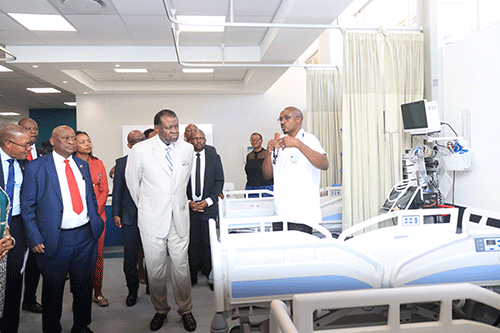Standard Bank and the Motor Vehicle Accident Fund yesterday unveiled the renovated Katutura Intermediate Emergency Care Unit, which was completed at a cost of N$12.6 million.
Officiating at the event, President Hage Geingob expressed his gratitude for this project, highlighting its significance in the broader context of government initiatives to enhance the accessibility and responsiveness of the public health sector to better serve the people.
He emphasised the government’s unwavering commitment to prioritising the public health sector as evident through the substantial budget allocation to the Ministry of Health and Social Services, which secures the sector’s continued development and growth.
“We have been, and continue to be, committed to ensuring the health sector is resourced and capacitated to recruit the required human resources; to develop physical infrastructure; to procure equipment, and to secure medicines and clinical supplies required for the effective operation of our health facilities at all times,” he said.
The President added there are some challenges currently confronting the health sector, and it is encouraging that the relevant offices, ministries and agencies are working at finding solutions for the immediate, medium and long term across public health service areas.
“I strongly believe that the current challenges are not insurmountable and will be overcome through dedicated interventions and multi-sectoral collaborations, guided by a whole-of-government and whole-of-society approach in the spirit of health in all policies, and the One Health approach, which places coordination and collaboration at the centre across the human-animal-environment interphase,” said Geingob.
Recently, Cabinet approved a comprehensive plan, prepared by the Ministry of Health and Social Services, to improve Namibia’s public health system.
The implementation thereof has already commenced during the current financial year at a cost of more than N$16 billion.
The plan envisages the execution of impactful projects and interventions in the public health sector across the country.
Some of the projects that are already being implemented include the construction of the Windhoek District Hospital, the establishment of intensive care units, as well as dialysis care units at district hospitals around the country.
Additional projects include renovations of existing hospital buildings and the installation of oxygen-generating systems at different health facilities around the country.
The Namibian leader urged all entities and individuals involved in the implementation of this important plan to prioritise these activities with utmost urgency.
“Health affects all aspects of our lives. It affects the productivity of the workforce. Only a healthy nation can be a productive nation. In this regard, the primary healthcare approach must continue to be at the centre of our public health interventions. Programmes aimed at creating and spreading awareness of disease prevention must be strengthened,” he said.
Standard Bank CEO Erwin Tjipuka said two years ago, their two entities, with an aligned vision and shared values, came together and identified the need for access to quality healthcare.
“We heard the cries of our community, and it was our moral obligation to take action. The seed was planted – and for two years, a team of gardeners ploughed into this project, cultivating our shared dream until it blossomed into the state-of-the-art emergency unit we are here to celebrate today,” he said.
Tjipuka said it is their responsibility to invest in the community because they understand the success of the people is interconnected to the success of corporate Namibia.
Therefore, they are committed to cultivating a country that stands for equality and access, where every human being, irrespective of their background and socio-economic status, is entitled to quality healthcare.
He noted that doctors and nurses, “the heroes of healthcare”, deserve a facility that matches their dedication and commitment.
“They deserve a place where they can provide the best care possible without any compromises. This renovated emergency unit is a testament to our belief in the essential role you play in saving the lives of our people.”
On his part, MVA Fund board chairperson Shitaleni Herman said this collaboration signifies a harmonious alignment of objectives and purpose towards the United Nations Sustainable Development Goals as adopted by the Namibian government, which is directed towards good health and well-being, as well as various government policies, particularly the Harambee Prosperity Plan 2 on social progression.
“The MVA Fund’s history with the Ministry of Health and Social Services has come full circle, since the first investment almost 20 years ago. The partnership that started with equipment donations, and training of doctors, nurses and ambulance drivers has translated into a memorandum of understanding to assist the ministry in improving public health facilities in the interest of both institutions to the benefit of our country’s citizens,” he said.
Minister of Health and Social Services Kalumbi Shangula said a strong health infrastructure remains at the centre of the delivery of quality health services.
He added that the emergency unit, or casualty as it was previously referred to, is the biggest and busiest emergency unit in the country.
More than 90% of the patients admitted to the Katutura Intermediate Hospital and Windhoek Central Hospital are first attended to in the emergency unit before admission.
All other regional and district hospitals in the country refer all patients with urgent and life-threatening conditions through the emergency unit at the Katutura Intermediate Hospital.
“On average, the emergency unit attends to a total of 4 600 patients per month, which is roughly 150 patients per day. However, this number increases to over 200 patients per day during weekends at the end of the month. The emergency unit has a staff complement of 35 nurses, 16 medical officers and two emergency medicine specialists. There are several cleaners and porters, all of whom work tirelessly with dedication and commitment 24 hours a day, seven days a week and 365 days a year,” he said.
Shangula said the hospital has been undergoing renovations, upgrading and restructuring over the years.
Recently, the former Namibia Institute of Pathology building was renovated and converted into a Paediatric Ward.
A new 98-bed ward was added to the hospital, and it is also hosting the new 16-bed dialysis unit.


